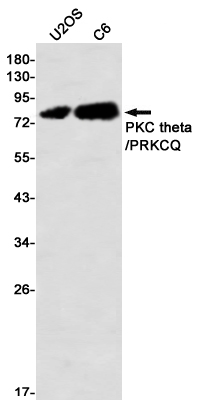
| WB | 1/500-1/1000 | Human,Mouse,Rat |
| IF | 咨询技术 | Human,Mouse,Rat |
| IHC | 咨询技术 | Human,Mouse,Rat |
| ICC | 技术咨询 | Human,Mouse,Rat |
| FCM | 咨询技术 | Human,Mouse,Rat |
| Elisa | 咨询技术 | Human,Mouse,Rat |
| Aliases | PRKCQ; PRKCT; Protein kinase C theta type; nPKC-theta |
| Entrez GeneID | 5588 |
| WB Predicted band size | Calculated MW: 82 kDa; Observed MW: 79 kDa |
| Host/Isotype | Rabbit IgG |
| Antibody Type | Primary antibody |
| Storage | Store at 4°C short term. Aliquot and store at -20°C long term. Avoid freeze/thaw cycles. |
| Species Reactivity | Human,Rat |
| Immunogen | A synthetic peptide of human PKC theta/PRKCQ |
| Formulation | Purified antibody in TBS with 0.05% sodium azide,0.05%BSA and 50% glycerol. |
+ +
以下是关于PKCθ抗体的3篇参考文献概览,涵盖其在免疫学中的关键研究:
---
1. **文献名称**:*Selective role of PKC-θ in T cell activation*
**作者**:Sun Z. et al.
**摘要**:研究通过PKCθ抗体发现PKCθ在T细胞受体(TCR)信号传导中的特异性作用,尤其在NF-κB激活和IL-2产生中不可或缺,但对其他TCR通路影响较小,提示其选择性调控机制。
2. **文献名称**:*Protein kinase C-θ is critical for the development of in vivo T helper cell Th2 cytokine production*
**作者**:Manicassamy S. et al.
**摘要**:利用PKCθ抗体及基因敲除模型,揭示PKCθ通过调控转录因子(如NF-κB)特异性促进Th2细胞分化,缺乏PKCθ的小鼠Th2相关细胞因子(如IL-4)显著减少,提示其在过敏和自身免疫中的潜在靶点。
3. **文献名称**:*PKC-θ-deficient mice exhibit impaired CD4+ T cell activation and altered TCR signaling*
**作者**:Baier G. et al.
**摘要**:通过PKCθ抗体检测发现,PKCθ缺失导致T细胞增殖受阻、AP-1激活缺陷及免疫突触形成异常,证实其在TCR信号转导中的核心地位,为免疫疾病治疗提供理论依据。
---
以上研究均利用PKCθ抗体探究其在T细胞功能调控中的作用,涵盖基础机制及疾病相关性。如需具体实验细节或更多文献,可进一步扩展检索范围。
Protein kinase C theta (PKCθ) is a member of the protein kinase C family, predominantly expressed in T cells and skeletal muscle. It plays a critical role in T-cell receptor (TCR)-mediated signaling and immune synapse formation, making it essential for T-cell activation, proliferation, and differentiation. Unlike other PKC isoforms, PKCθ selectively localizes to the immunological synapse upon TCR engagement, where it interacts with adaptor proteins to regulate downstream pathways, including NF-κB and AP-1. which are vital for inflammatory responses and immune regulation.
PKCθ-specific antibodies are valuable tools in immunological research, enabling the study of its expression, localization, and function in immune cells. These antibodies are widely used in techniques like Western blotting, immunofluorescence, flow cytometry, and immunohistochemistry to investigate PKCθ's role in health and disease. For instance, PKCθ has been implicated in autoimmune diseases (e.g., rheumatoid arthritis, multiple sclerosis) and graft-versus-host disease due to its pro-inflammatory signaling. Conversely, its deficiency or inhibition may impair anti-tumor immunity, highlighting its dual role in pathology and therapy.
Research on PKCθ antibodies also explores therapeutic potential, as targeting PKCθ could modulate aberrant T-cell activity in autoimmune conditions or enhance immune responses in cancer. Their development and application continue to advance understanding of T-cell biology and immune-related disorders.
×